- About Us
- Columns
- Letters
- Cartoons
- The Udder Limits
- Archives
- Ezy Reading Archive
- 2024 Cud Archives
- 2023 Cud Archives
- 2022 Cud Archives
- 2021 Cud Archives
- 2020 Cud Archives
- 2015-2019
- 2010-2014
- 2004-2009
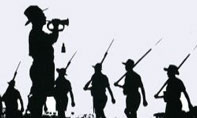 |
A Letter From Gallipoli 6/11/97 |
The journey to:
We caught a bus to Chanakale, over the water from Gallipoli. On the bus I was sitting behind a Turkish sailor. He somehow found out I was from Australia. He ripped his rank off and handed them to me. Both shoulders. I could decipher he was a corporal. He gave me his stripes. I always thought that was a very punishable offence. He obviously thought I was worth it. I was flattered and stunned.
The place before Gallipoli:
We are in Chanakale and there is an air of expectation. At the hostels there are Aussies and Kiwis everywhere. We play cards together. The game of Asshole. For the first time there is no ribbing about the rugby. For the first time it feels as if Australians and Kiwis are too damn similar for our own liking. We have nothing to argue about because we are both here for the same reason. We are ANZACS. The Turkish staff knows where we are going tomorrow. It's the only reason they have business. They put on Peter Weir's film Gallipoli. We've all seen it. But somehow tonight is special. A group of ten sit in this room in silence. A few tears. We are here. We don't really know why this is special. But it is . It is our folklore. We have travelled here, many from different places. We are near Gallipoli.
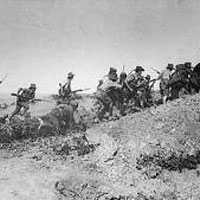 The day:
The day:
We catch a ferry across with a guide that introduces himself as Mal Meninga. And bloody oath he looks like Mal Meninga. He speaks in a thick Turkish accent. He collects things and takes tours. Never realised it meant that much to the Turkish. Always thought it was an ANZAC thing.
At Gallipoli:
We are in Gallipoli. I wouldn't lie to you. Some of the most memorable days. A few mates and I felt like we were kids in a playground. Went digging for treasure. Thought we could find some relics. Couldn't take 'em with us, but fuck it was fun. I could spend days there! Here's the letter I wrote. I'll let you figure out the emotion of the finds:
The letter:
Found a bullet....
A bully beef can opener. (this I still have)
My friend decided to dig on the beach, the Anzac beach, at Anzac cove. We dug as though we were building sand castles. He pricked his thumb. What's this? We dug and dug and pulled out a bayonet. An original bayonet! We would have to give it to Mal.
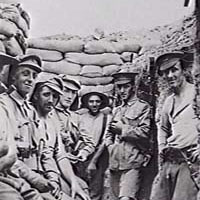 There's silence.
There's silence.
Silence in the old trenches (except for us).
Pine needles cloak the sand that once was caked in blood. We shoot cameras not guns. Lens caps fall, not heads. Barbed wire still holds the old dugouts together.
It is good luck to find a bullet, not bad, as it was then.
From Lone Pine one could see apartments not bodies. And to think it was from here that they played cricket and saw their mates slaughtered.
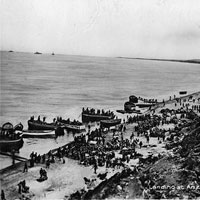 We are back on the bus. The bus has gone quiet. Lest we forget.
We are back on the bus. The bus has gone quiet. Lest we forget.
The sun sets on their memories. They are different memories and a different sun. There are men listed dead who died our age.
Why do we go?
To commemorate mateship, bravery, adventure or joking?
To see where Australia and New Zealand became nations?
To ponder upon where exactly the grandfathers and great grandfathers of our countrymen and women have fallen?
The English command was pretty much as competent as that of Mustafa Kemal (Attaturk). But we're not taught what the Turkish went through. We are not taught that at school:
"I'm not ordering you to attack, but to die...."
We're not taught that at school.
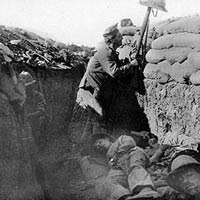 And die they did. It was not unusual for the Turks to lose in one day what the Australians lost throughout the whole campaign. When we left, 60,000 gallons of rum were burnt. We evacuated without drunkenness!
And die they did. It was not unusual for the Turks to lose in one day what the Australians lost throughout the whole campaign. When we left, 60,000 gallons of rum were burnt. We evacuated without drunkenness!
In Gallipoli:
There are unbridled hills. Thyme bushes.
And instead of ducking bullets today we ducked photographs. They dug tunnels and found shrapnel in their arms.
All the names on the graves are familiar to me. Even the 14-year-old boys who wanted to fight and die with their brothers.
Mitchell. Kirby. Alsop. Crowther. Robinson. Mason. Pryce. Bell. Broughton. Horrocks. Grims. Primrose. Stevenson. Hudson. Haynes. Willmott.
There are seven metres between the frontlines at Lone Pine. 400 fell in one day at the Nek. There was a beach 20 metres wide. Games of cricket were played where the bowlers might get shot. Certainly added a competitive twist...
They were baffled soldiers with steel hearts. An ignorant rabble with leather skin. They were dug-in jokers respecting moustaches.
The Turks threw fruit to us. We exchanged cigarettes. The enemy fed us. So we could both go on fighting for another day. They even gave us water because we were dying of dysentery. We had a peace fire for two days so we could both clear no'man's lands of the bodies.
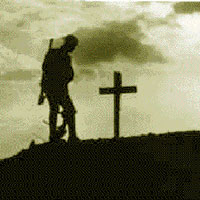
We were able to stop fighting to talk and discuss the state of death that surrounded us.
Why do we revere this piece of ground?
Why do we take home its sand?
It is familiar. A knowledge of a bond and tie with other Australians and New Zealanders. The Sydney person gets along with the Western Australian. Darwinians with Victorians. Kiwis and Aussies. Our little corner.
Why is this site more or less important in our hearts?
Valiant losses. Curiosity with the barbaric or proof of a past?
The poem:
Here's the poem I wrote in a Turkish cafe across the water, playing backgammon and thinking about the absurdity of it all. For Gallipoli achieved nothing but reminiscence and friendship between the Johnny and the Aussie and Kiwi. War is absurd. The absurdest of the absurd.
Under a crescent moon they die
Under a setting sun
With the snow coming
and lieutenants falling
like the pine that stands
at the peak of a ridge
they burn
in patriotic revelry perhaps,
victims of disease perhaps,
victims of alliance.
Both sides
from countries insignificant.
Where do those country men visit?
Those men that led these useless
battles, waging bullets
for bottles, and death
for paper and insignia.
The victim's heirs
visit these graves,
while the suns set,
while the winds blow.
Let's hope we'll never stand still
like corpses frozen
like blood in snow.
Or eat grim shells
from respected artillery.
Let's hope
we shake hands
sharing patches
friendship, not war.
Glory of war
with its fingers broken
sank the youth
which fought that day.
Glory of war
bred confusion
led men to their graves
pulling Australia away.
Glory of war
may have formed a nation
bred a flag
with hearts and lives.
Glory of war
destroyed elation
sent bloody eyes
to a bloody choir door.
Lest we forget
the Gods of politics
who shook hands with bodies
and signed papers in blood.
They payed for their victory
with the loss of families,
still do.
There's nothing you can write
when you sit across the water
from the site of a mindless slaughter
where two countries
who respected each other
were ordered to shoot
their friends made into foe.
While countries exchanged mortar
the frontline threw oranges.
While royalty confided
their enemy soldiers exchanged water.
While the Kings fucked the Kaisers,
two countries killed their sons.
Lest we forget
the British perhaps,
the Germans perhaps,
the Leaders perhaps,
Lest we forget,
the war in all.
But not the slaughter,
or the men rotting
or the dysentery in the trenches
or the thousands of unfilled graves.
Under a crescent moon they died
and under a setting sun.
Faces in photos resemble faces of friends
as do the names of the dead.
We salute you.
If not for the bravery
then for the courage of loss.
Before war again let there be revolution.
Nothing is worth killing for
if we have the ability to smile.
Let us remember
that those who fought
will never forget
for the glory of war
was never theirs.
Under a crescent moon they die
Under a setting sun
This article was first published in The Cud in April of 1997.
